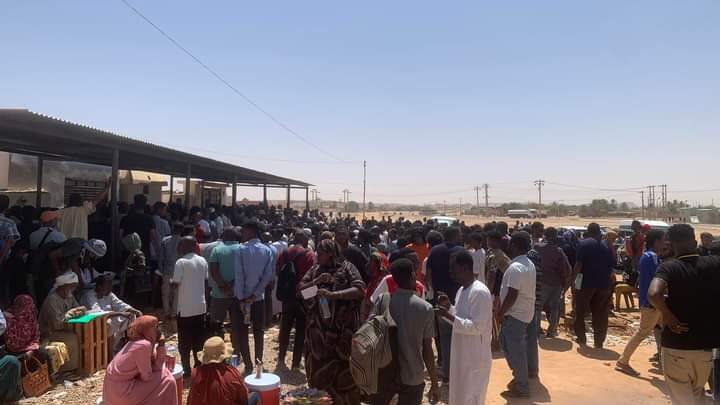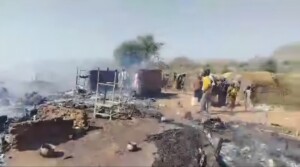Egypt asked to ease visa procedures for Sudan transport drivers and medical patients

Sudanese crowding in front of the Egyptian consulate in Wadi Halfa, waiting to obtain a visa, on May 18, 2023 (File photo: RD correspondent)
The head of the transport chambers in Wadi Halfa locality on Sudan’s northern border with Egypt, Esam El Kheir, has called on the Egyptian authorities to facilitate the entry of Sudanese drivers and ease visa procedures. According to him, Sudanese transport drivers “are an important and influential segment in the Sudanese economy and commercial trade between the two countries”.
El Kheir told Radio Dabanga that the Egyptian authorities have suspended multiple visas for Sudanese drivers, with special exception for those over 50 years of age, while “the consulate imposes obstacles and demands impossible conditions in matters that should fall under the jurisdiction of the of the Sudanese Ministry of Justice. He appealed to the authorities in the Egyptian Foreign Ministry to activate “the four freedoms* for Sudanese drivers, similar to their Egyptian colleagues, who enter and do not need a visa, the majority of whom are over 50 years old”.
He added that Sudanese drivers have become unemployed due to these measures, noting that the chambers have addressed officials in the Ministry of Transport in Sudan to respond to these issues.
Displaced
A member of the People of Wadi Halfa Locality Council called Ashraf appealed to international and regional organisations to contribute to provide blankets for the displaced in shelter centres in the locality, to protect against the cold. He noted that the displaced, most of whom fled the war in Khartoum and have been stranded on the Sudanese side of the border, now number 7,000, and are constantly increasing.
He called on the Egyptian authorities to facilitate the procedures for granting the visa for patients in need of medical care. He told Radio Dabanga that the consulate approves 25 visas a day, while the daily number of patients exceeds 150. He expressed his concern about the increase in deaths among those waiting for treatment, as it has reached more than 60 cases since the beginning of the war in mid-April; most of them are elderly people and suffer from kidney failure.
He says that the number of displaced people is increasing significantly and exceeds the local capacity.
As reported by Radio Dabanga last week, the deputy chairman of Sudan’s Sovereignty Council, Malik Agar, has pledged “to take urgent decisions” to resolve complications currently facing Sudanese vehicles at Egyptian border posts, and resume work to restore railway lines.
In a meeting with Agar on Monday, Sudan’s Acting Transport Minister Abubakr Abdallah said there are complications that should be discussed with the Egyptian authorities regarding the crossing of Sudanese vehicles and trucks through the Ashkeet and Argeen border crossings near the High Dam port, in Sudan’s Northern state.
Minister Abdallah pointed out that Egyptian lorries are able cross into Sudanese territory without complications.
The Ministry of Transport in Sudan and the Egyptian Foreign Ministry have been approached for comment.
* In 2004, Egypt and Sudan signed the Four Freedoms Convention, allowing free movement of citizens between both “brotherly countries”, as well as working and owning property with no special permit. Soon however, it became clear that Sudanese men between 18 and 50 years old still needed a visa to be able to enter Sudan. In 2018, the authorities in Cairo officially requested a restriction on the entry of Sudanese to Egypt. On June 10 this year, after more than 200,000 Sudanese had sought refuge in Egypt from the war, Cairo decided to oblige all Sudanese to obtain an entry visa.











 and then
and then